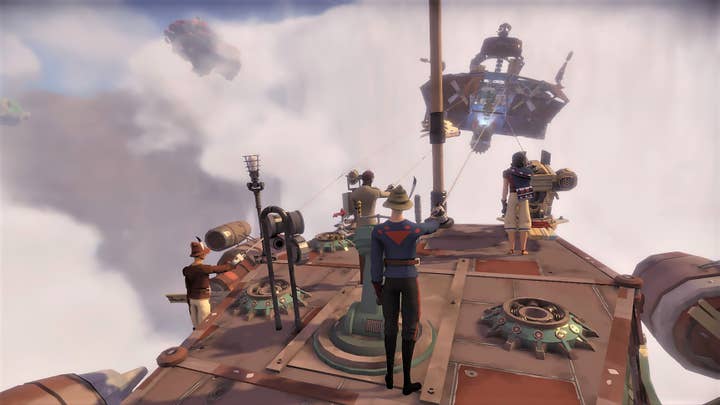No longer Adrift: How Bossa reset course after closing its biggest project
General manager Daniel Clough tells us the indie studio is refining the way it releases games
Worlds Adrift was a massive undertaking for a studio like Bossa. The sky pirate MMO featured a persistent world that retained every shipwreck, was populated by AI creatures that continued to hunt and breed even when no-one was online, and was constantly expanding with user-generated islands.
This was enabled, of course, by Improbable's SpatialOS -- in fact, Worlds Adrift was the first game announced to be using the technology, and the first to make it into the public's hands when it entered Early Access last year.
Then, in a surprising move, the game was closed.
When its demise was announced earlier this year, Bossa Studios said the game had not "reached the level of popularity it needs to continue" and that "all our work went into making the game work rather than making it the experience we wanted it to be."
"As a result we failed at making a game that could capture the imaginations of millions," the company continued. "Creating an MMO like Worlds Adrift is a huge financial commitment and unfortunately the game is just no longer commercially viable." A few months on, and the developer remains convinced it was the right course of action for the future of the studio.

"Not every game lasts forever," general manager Daniel Clough tells GamesIndustry.biz. "[Developers] have to constantly weigh up how big the team is, commercial performance, all of those types of things -- it just naturally came to a point where we felt that it would be better that that game close and we focus on different things as a studio."
Clough acknowledges that Worlds Adrift was a "really big bet for the studio" but maintains the team is still "super, super proud of what we achieved."
Worlds Adrift was the first of three SpatialOS-powered titles to be closed or cancelled in quick succession, followed by Spilt Milk Studios' Lazarus and Automaton Games' Mavericks: Proving Grounds.
This, combined with Bossa's earlier comment about the effort required to make the game work, doesn't paint the best picture for Improbable or its widely-lauded tech. Clough assures there were multiple reasons for Worlds Adrift's closure, including the limits of Bossa's resources and its shifting priorities as a business, although the technical difficulties were undeniably a factor.
"It was early stage tech -- there are always challenges when you work with early stage technology, but we worked with Improbable on those," he says. "I don't think we would pin the success or failure of the game on that technology.
"Any technology when you're working with it, and when they're building a bunch of things as you're working with it... there are always going to be more challenges than if you take something completely robust that you've built on before. But we don't really think about that project and link it to that challenge. It was a combination of things."
"There are always challenges when you work with early stage tech, but I don't think we would pin the success or failure of the game on that technology"
Clough notes that in the last six months of the game's life, Bossa "didn't have a particularly big team" assigned to Worlds Adrift. The studio's total headcount currently stands at around 80 to 90 people, and with multiple projects on the go, the developer wasn't able to dedicate the manpower that other MMOs require.
It helped, of course, that the community was able to create its own content, including whole new areas for others to explore -- something Bossa told us last year was core to the game's future. Clough says the team worked closely with these players as it prepared for Worlds Adrift's closure, yet it's been almost impossible to prevent most of those users drifting away from Bossa. It's not a natural leap from an ambitious MMO to, say, I Am Bread.
Still, Clough remains hopeful that Bossa can reconnect with the audience it spent years gathering: "We put a lot of thought into how we'd work with the community as we closed it. There have been some offers around some of the future games we build -- they'll have access to those, things like that to sweeten things a little bit.
"We hope some of the games we build going forward, while they won't be exactly like Worlds Adrift, there are going to be elements around them... Bossa is pretty big on user-generated content and there's a lot of interesting ideas so I don't think we've ruled out that community. We're hopeful we can reach back out to them and they'll be future players of our games."
Another factor behind Worlds Adrift's shutdown was a shift in company strategy. Towards the end of 2018, the Bossa team reflected on what it wanted to commit to for the next couple of years. It's already working on adventure title The Bradwell Conspiracy, plus a project for Apple Arcade and a few unannounced games that are expected to see emerge next year. And then there's Pigeon Simulator.
The sandbox physics game certainly appears more in keeping with Surgeon Simulator and I Am Bread, the type of titles Bossa has come to be known for. Was the studio returning to safe territory after the failure of Worlds Adrift? Clough says "there's an element of that", but it's also because Pigeon Simulator "is definitely more within our wheelhouse in terms of what we can execute."
"We've actually been super surprised by how much attention it's got since we teased it online," he says. "It's a combination of that public validation and public anticipation for it, and the fact that it's much more in our wheelhouse. We've got a ton of really interesting ideas for that."
"Bossa can continue to do games like Worlds Adrift and complicated AI games as well as other stuff, but we have to be realistic about the size of studio that we are"
Bossa is also keen to do more with the dozens of prototypes it's producing on a regular basis. Every month, the company holds a studio-wide game jam, giving everyone a two or three-day respite from their projects to come up with something new. As a result, Clough tells us it produces around 100 potential games per year, ranging from simple single-player games to full-blown multiplayer affairs with user-generated content.
Obviously, not all of these make it to full production -- an opportunity Clough believes the company is missing out on.
"Bossa has a ton of ideas from these game jams, and the challenge is trying to work out which ones have the potential to be released," he says. "I think we can do a lot more in terms of publishing some of those titles -- that's something I'm actually directly working on.
"Some of that comes down to improving the production of the studio, bringing in more talent, and basically positioning the studio so these games can move through from pre-production into production and into open development. I think we can do a lot more on that."
Crucially, this does not mean Bossa Studios has lost any of the ambition it showed with Worlds Adrift. While that game was not to be, and nor was Chet Faliszek's open-ended AI-powered tactical shooter, the company still wants to work on much larger titles in future.
"We're trying to make sure as a studio we can take these kind of ideas but also have enough talent, capacity and process to be able to work on these games," Clough says. "Some of the stuff we have in development are pretty big bets.
"I think the studio can continue to do games like Worlds Adrift and complicated AI games as well as other stuff, but we have to be realistic that we're the size of studio that we are."


